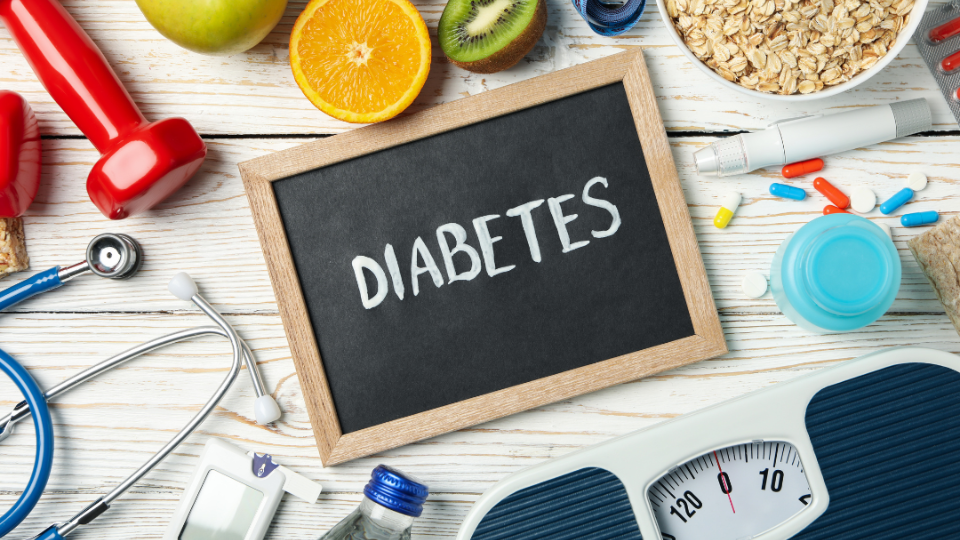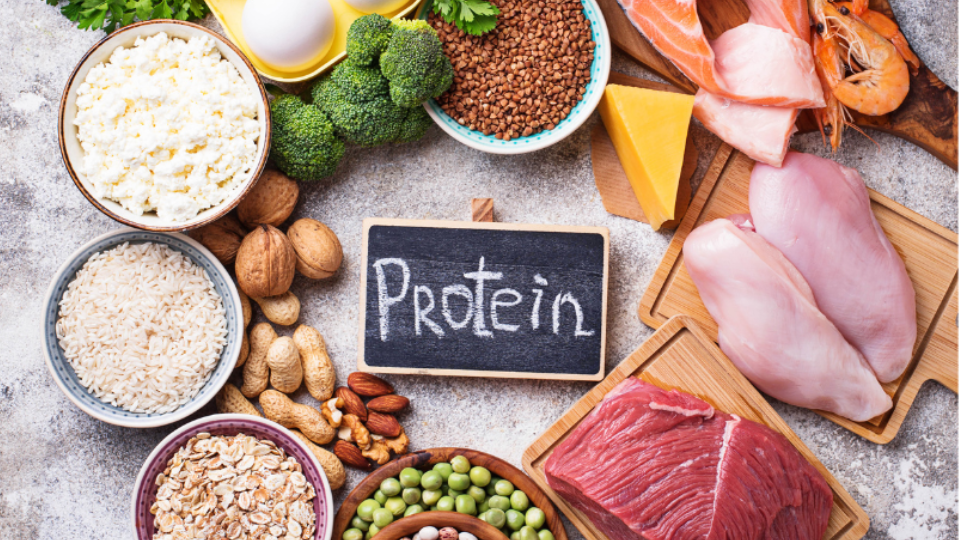Anxiety and Depression: Can Diet Help?

In November 1944, Dr. Ancel Keys and Dr. Josef Brozek, faculty at the University of Minnesota, conducted a study on the effects of starvation, known as the Minnesota Starvation Study (Baker & Keramidas, 2013). Through this study, it was observed that a lack of nutrients can lead to intense physical and psychological changes such as decreased strength and stamina, as well as increased fatigue, irritability, depression, and overall disinterest (Baker & Keramidas, 2013). This was the first study of its kind to demonstrate the connection between nutrition and mental health.
Seventy-five years later, it is estimated that 20% of the general population has experienced a mental health disorder within the last 12 months, and 29% of the population will experience anxiety and/or depression in their lifetime (Steel, Marnane, & Iranpour, 2014). The common symptoms of anxiety and depression are similar to the psychological changes described by the subjects in the Minnesota Starvation Study ( Kanter, Busch, & Weeks, 2008; Newman, Llera, & Erickson, 2013). Depression is often characterized by: fatigue, difficulty concentrating, restlessness, irritability, trouble sleeping, loss in appetite, and feelings of hopelessness (Kanter et al., 2008). Likewise, anxiety is characterized by: irritability, feelings of being out of control, fatigue, weakness, excessive worrying, and trouble sleeping (Newman et al., 2013).
With less than half of individuals affected by mental health issues receiving professional treatment, selfcare and diet are becoming increasingly important as potential prevention methods (Opie et al., 2017). Although there is evidence to suggest relationships between some specific nutrients and mental health symptoms, not all of these relationships are well understood. As a result, many require further research before being implemented into practitioner recommendations.
How Anxiety and Depression Impact Diet

In order to understand how nutrition can impact mental health, it’s important to address how mental health impact nutrition. Anxiety and depression can decrease appetite, resulting in a lower intake of essential nutrients that the body needs (Kanter et al., 2008; Newman et al., 2013). Studies also reveal that individuals experiencing anxiety and depression may need increased amounts of certain nutrients to counteract the chronic stress their bodies are experiencing (Baranyi, 2016; Bloch & Hannestad, 2012; Du et al, 2016; Fedoce et al, 2018; Shafiee et al, 2018). Assessing nutrient intake and changing dietary patterns may be an appropriate supplement to pharmacological and behavioral therapies (Opie et al., 2017). Key neurotransmitter relationships (e.g., dopamine, norepinephrine, gamma-aminobutyric acid (GABA), and serotonin) also impact mental health status. As a result, imbalances of these neurotransmitters can contribute to mental health disorders (Nutt, 2008; Zarrindast, & Khakpai, 2015). Individuals experiencing anxiety and depression may feel a decrease in symptoms when increasing consumption of the nutrients listed in the table below:
Table 1. Nutrients Associated with Decreased Anxious and Depressive Symptoms
Nutrient Dietary Sources: How it Works Current Research
| Omega-3 Fatty Acids | Fatty fish, flaxseeds, chia seeds, walnuts, canola oil, soybean oil, fortified foods (United States Department of Agriculture [USDA], n.d.) | Omega-3 Functions:
|
The evidence for Omega-3s decreasing symptoms is mixed, with some studies finding improvement of symptoms, and some finding no changes in symptoms. This is an area that needs more research before a definitive conclusion can be made (Du et al, 2016; Sarris, 2017; Thesing, Bot, & Milaneschi, 2018). |
| Antioxidants |
Citrus fruits, tomatoes, broccoli, red/green peppers, leafy greens Vegetable oils, margarine, nuts and seeds, leafy greens Carrots, peppers, whole milk Oysters, red meat, poultry, seafood, fortified cereals (USDA, n.d.) |
Antioxidant Functions:
|
Patients experiencing anxiety tend to have a greater reduction in symptoms when eating an antioxidant-rich diet than those experiencing depression. It has been shown that anxiety and depression decrease the amount of antioxidants in the body. This is an emerging area of research, and though the results are promising right now, more research needs to be done (Du et al., 2016; Sarris, 2017; Shafiee et al, 2018). |
| Protein | Meat, dairy, nuts, whole grains, beans, soy products, seeds, nut butters (USDA, n.d.) |
Protein Functions:
|
An adequate intake of protein to decrease symptoms of anxiety and depression is consistent and positively supported by research (Baranyi et al, 2016; Opie et al., 2017; Sarris, 2017; ). |
| Vitamin D | Sunlight, egg yolks, liver (USDA, n.d.) | Vitamin D Functions:
|
Getting adequate Vitamin D, particularly from sunlight and not supplements, will most likely aid in decreasing symptoms of depression ( Sarris, 2017; Thesing et al., 2018). |
| Magnesium | Leafy greens, fruits, nuts, peas, beans, seeds, soy products, whole grains, milk (USDA, n.d.) | Magnesium Functions:
|
The impact of magnesium on symptoms of anxiety and depression is a new area of research. The research available shows positive associations between magnesium intake and a decrease of anxious and depressive symptoms, but no definitive conclusion has been made (Du et al., 2016). |
|
B-Vitamins |
|||
|
Vitamin B-6 |
Poultry, fish, starchy vegetables, non-citrus fruits |
|
Vitamin B-6 has demonstrated consistent impacts on depression and anxiety in the literature, with folic acid and Vitamin B-12 showing mixed results (Du et al., 2016;; Shafiee, 2018; Thesing et al., 2018). |
|
Folic Acid (Vitamin B-9) |
Leafy greens, fruits, beans, peas, nuts, enriched products | ||
| Vitamin B-12 | Animal products (USDA, n.d.) | ||
Nutrition can have an impact on symptoms of depression and anxiety for some people, just as symptoms of depression and anxiety can have an impact on nutrition. Although scientific findings for some of these nutrients are mixed, overall evidence indicates that a general balanced diet can decrease the symptoms of both anxiety and depression. The nutrients with most success in scientific trials are: antioxidants, protein, and vitamin B-6. Those with less consistent results include: omega-3s, folic acid, and vitamin B-12. Seeing as all of these nutrients are part of a healthful diet, proper nutrition can be an option to supplement other treatment methods for individuals with anxiety and depression.
*Please consult with your physician prior to making any changes to medications. It may also be helpful to discuss specific supplements and dietary changes with an expert in nutrition (e.g., registered dietitian) to help make positive changes to your diet that will last and help you feel healthier.
References
- Baker, D., Keramidas, N. (2013). The psychology of hunger: Amid the privations of World War II 36 men voluntarily starved themselves so that researchers and relief workers could learn about how to help people recover from starvation. Time Capsule, 44(9), 66. http://www.apa.org/monitor/2013/10/hunger.aspx. Accessed September 9, 2018.
- Baranyi, A., Amouzadeh, O., Lewinksi, D., Rothenhausler, H., Theokas, S., Robier, C., …Meinitzer, A. (2016). Branched-chain amino acids as new biomarkers of major depression—A novel neurobiology of mood disorder. PLoS One, 11(8). doi: 10.1371/journal.pone.0160542
- Du, J., Zhu, M., Bao, H., Li, B., Dong, Y., Xiao, C., …Vitiello, B. (2016). The role of nutrients in protecting mitochondria functioning and neurotransmitter signaling: Implications for the treatment of depression, PTSD, and suicidal behaviors. Critical Reviews in Food Science and Nutrition, 56(15), 2560-2578. doi: 10.1080/10408398.2013.876960
- Kanter, J. W., Busch, A. M., Weeks, C. E., & Landes, S. J. (2008). The nature of clinical depression: Symptoms, syndromes, and behavior analysis. The Behavior Analyst, 31(1), 1–21.
- Newman, M.G., Llera, S.J., Erickson, T.M., Przeworski, A., & Castonguay, L.G. (2013). Worry and Generalized Anxiety Disorder: A review and theoretical synthesis of evidence on nature, etiology, mechanisms, and treatment. Annual Review of Clinical Psychology, 9(1), 275-297.
- Nutt, D. J. (2008). Relationship of neurotransmitters to the symptoms of major depressive disorder. The Journal of clinical psychiatry, 69, 4-7.
- Opie, R.S., Itsiopoulos, C., Parletta, N., Sanchez-Villegas, A., Akbaraly, T.N., Ruusunen, A., & Jacka, F.N. (2017). Dietary recommendations for the prevention of depression. Nutritional Neuroscience, 20(3), 161-171. doi: 10.1179/1476830515Y.0000000043
- Sarris, J. (2017) Clinical use of nutraceuticals in the adjunctive treatment of depression in mood disorders. Australian Psychiatry, 25(4), 369-372. doi: 10.1177/1039856216689533
- Steel, Z., Marnane, C., Iranpour, C., Chey, T., Jackson, J. W., Patel, V., & Silove, D. (2014). The global prevalence of common mental disorders: a systematic review and metaanalysis 1980–2013. International Journal of Epidemiology, 43(2), 476–493. http://doi.org/10.1093/ije/dyu038
- Shafiee, M., Ahmadnezhad, M., Tayefi, M., Arekhi, S., Vatanparast, H., Esmaeili, H., …Ghayour-Moharban, M. (2018). Depression and anxiety symptoms are associated with prooxidant-antioxidant balance: A population-based study. Journal of Affective Disorders, 238, 491-498. doi: 10.1016/j.jad.2018.05.079
- Thesing, C.S., Bot, M., Milaneschi, Y., Giltay, E.J., Penninx, B.W.J.H. (2018). Omega-3 and omega-6 fatty acid levels in depressive and anxiety disorders. Psychoneureoendocrinology, 87, 53-62. doi: 10.1016/j.psyneuen.2017.10.005
- United States Department of Agriculture. Appendix C: Nutrient chart-function, deficiency and Toxicity symptoms and major food sources. Retrieved from https://wicworks.fns.usda.gov/wicworks/Topics/FG/Appendi xC_NutrientChart.pdf. n.d. Accessed March 12, 2019.
- Zarrindast, M. R., & Khakpai, F. (2015). The Modulatory Role of Dopamine in Anxiety-like Behavior. Archives of Iranian Medicine (AIM), 18(9).
Authors
Megan Jensen, Dietetics Student, Mateja R. Savoie Roskos, PhD, MPH, RD; Ashley Yaugher, PhD; Sandy Sulzer, PhD
Related Nutrition Articles
















